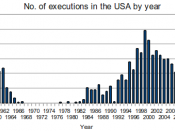Discuss and evaluate the arguments for and against the use of the death penalty.
Capital punishment is "the infliction of death as punishment for certain crimes" (dictionary online). In the Bible itself it prescribes death for crimes such as murder, kidnapping, witchcraft and many more. By 1500, in England, only foremost felonies conceded the death penalty - murder, larceny, burglary, rape, arson and treason. However, from 1723 under the "Waltham Black Acts", Parliament enacted several new capital offences which led to an increase in the number of individuals being put to death each year. In the 100 years from 1740 - 1839 there were a total of up to 8753 civilian executions in England & Wales, the peak year was 1785 with 307. Which is a vast amount as the population in the year 1800 was only nine million.
The modification of the capital punishment began in Europe by the 1750's and was championed by intellectual people such as the French philosopher Voltaire, Italian jurist Casare Baccaria and the English law reformer Bertham.
They criticized the death penalty as it was seen to them as senselessly, over-rated as a deterrent, brutal and sporadically imposed in fatal error. As an alternative they defended life imprisonment as a more reasonable option, this also was supported by other social reformers and Quaker leaders.
By 1850, these alterations began to take place; Portugal and Venezuela were the first nations to eradicate capital punishment altogether. Michigan, in the United States was the first state to abolish it for murder in 1847. Today, the death penalty is virtually non-existent in all of Western Europe and most of Latin America.
The USA, alongside Japan, China, some African states and many Asian and Middle Eastern countries still preserve capital punishment for certain crimes.
Arguments for the...


